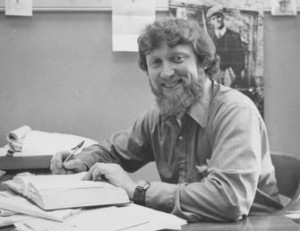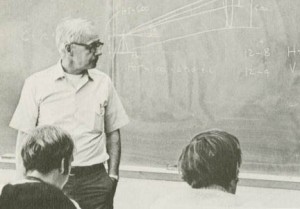At its April 3 meeting, the faculty adopted the following memorial resolution for Joseph Martin, associate professor emeritus of English, who died Feb. 5, and at its May 1 meeting, the memorial resolution for William C. Holstein, associate professor emeritus of civil engineering, who died March 6.

Joseph Martin, associate professor emeritus of English
Associate Professor Emeritus Joseph Martin was born on August 16, 1938, in New York City, and attended primary and secondary schools there. On graduation from Fordham University in 1959, Joe served six months’ active duty in the United States Army Reserves, then a year as a social worker in New York. The following two years found him teaching ninth and eleventh graders in Bellevue High School, Pittsburgh, Pa. At the same time he was earning a Master of Arts degree from Indiana University, preparing to enter, in 1965, the program for Doctor of Philosophy in English at The Pennsylvania State University.
Joseph Martin joined the faculty of Lafayette College in the fall of 1967 as an Instructor of English. On completion of his doctorate in 1971, he was promoted to Assistant Professor and, in 1973, to Associate Professor. His areas of specialization were nineteenth- and twentieth-century British literature and Literary Theory, with research interests in Joseph Conrad, Samuel Beckett, Margaret Drabble, John Fowles—and, of course, the preeminent Irish writer of the twentieth century, James Joyce.
In 1972 a Summer Research Fellowship allowed Joe to conduct research in England and Ireland, resulting in an article in Texas Studies in Literature and Language on Edward Garnett as editor of the work of Joseph Conrad. Three times Joe was chosen to participate in National Endowment for the Humanities summer institutes at Smith College, the University of Colorado, and the University of Wisconsin. In 1986 he participated at Lafayette in a Sloan Seminar on Technology, and in 1986 and 1987 he joined the Mellon Seminar to Develop the Freshman Common Experience. With James Lusardi he served as a Teaching Fellow for an NEH-sponsored literature institute for high school teachers.
Joe offered special service to Lafayette and to English in a number of ways. He directed the Theodore Roethke Poetry Festival for the years 1980, 1985, and 1987. He served as Assistant Head of English from 1985 to 1990 and as Acting Head for fall semester, 1985, and spring semester, 1988. From 1993 until his retirement, Joe was Internship Coordinator for the English Department. His College committee service included Academic Council, Advanced Study and Research, and Academic Progress, which he chaired.
Joe was especially proud of his range and versatility as a teacher, offering all the department’s introductory writing and literature courses, courses in nineteenth- and twentieth-century British fiction, special topics courses in British writers, and the “Seminar on Literary Criticism.” In 1983 he created and taught “Film and Literature,” now a staple in the department program for general education. He was one of the pioneers in teaching a First-Year Seminar. In 1974 he was awarded the Jones Superior Teaching Award and gave that fall’s Jones Lecture.
As all who knew Joe can attest, he was especially proud of his Irish heritage. His interest in Ireland and Irish culture led to his offering an interim course in Ireland, first with Professor Jerry Heavey, then with Visiting Assistant Professor Jack Truten. For three weeks Joe led students on a roughly chronological tour from the 5,000-year-old burial mound of Newgrange to the Dublin of James Joyce. Joe’s enthusiasm for the experience was everywhere evident, reciting poetry at the sites visited, engaging in conversations with the people at every place. Joe began a study of Gaelic, still spoken in Western Ireland, preparing for these conversations. The course Joe taught with Jerry and Jack, entitled ‘The Land and Landscape of Ireland,” was an experience of the land and its importance in Irish history, economy, politics, imagination, and poetry. Joe’s veneration of things Irish was such that, when he arrived in Dublin, he faithfully observed the ancient and honorable tradition of the “pub crawl.”
After his retirement, Joe continued his study of Gaelic; when he co-directed his last Ireland study abroad course during interim 2005, he was fluent enough to converse comfortably with the Gaelic-speaking people he met in Western Ireland. Always an avid reader, after he retired Joe especially delved into books on spirituality; he also began exercising his artistic talents through the creation of works of assemblage…3-D collages comprised of “found” and discarded items. And he spent a great deal of time visiting with his children and grandchildren or hosting them at his home in the Poconos.
Joe Martin was a bright, intellectually curious man with a wry sense of humor and a rapier wit. His public face was often that of a cynic or skeptic, but behind that facade was a kind, sensitive, and generous human being. Particularly notable was the way Joe took time to mentor and befriend new faculty, including—and perhaps especially—the English Department’s visiting and adjunct faculty, maintaining friendships with many of them long after they left Lafayette.
Joe Martin died on February 5, 2012, at the age of 73. A loyal friend as well as a colleague, he will be sorely missed by many members of the Lafayette community. He is survived by five children and six grandchildren.
Mr. President, I move that this memorial resolution be filed with the minutes of this meeting and that copies of it be sent to members of Professor Martin’s family.
Deborah Byrd, chair, Associate Professor of English
Jerome Heavey, Professor of Economics
David Johnson, Professor of English
********

William C. Holstein, associate professor emeritus of civil engineering
William C. Holstein was born on March 25, 1924 in Mt. Washington, Pa. He attended Bethel Township High School near Pittsburgh, graduating in 1942 and immediately enrolling in the V-12 Navy College Training Program at Union College in Schenectady, N.Y. While at Union College he lettered in golf, baseball, and basketball and was awarded the Warner King Prize, an award honoring a graduating engineer who has contributed to the traditions and ideals of Union College. He graduated with a B.S. in Civil Engineering in 1945 and served in World War II as a U.S. Navy Civil Engineer through 1946.
After the war, he worked as a draftsman for Gulf Oil and then taught at Union College and Rensselaer Polytechnic Institute. He completed his master’s degree at Rensselaer in 1951 and returned to Pittsburgh to work as a design engineer for Richardson, Gordon & Associates, obtaining his license as a Professional Engineer and where he was part of a team that designed several major bridge structures in the Pittsburgh area, notably the Fort Pitt Bridge and the Fort Duquesne Bridge. The team also designed the 4,500-foot long Pennsylvania-New Jersey Turnpike bridge over the Delaware River.
In 1959 William (known as Bill to faculty and friends) joined the faculty at Lafayette College and three years later was promoted to Associate Professor. He taught courses in Surveying, Highways, Transportation, Planning and Design, Materials Laboratory, Fluids Laboratory, Computer Analysis, Steel Design and Concrete Design. He was an active department member who loved working with students, serving as faculty advisor for the student chapter of the American Society of Civil Engineers, and he and his wife Merita regularly enjoyed entertaining students at their home. He helped students bridge the gap between the classroom and the world of engineering consulting by involving students in his surveying and computer analysis projects.
Outside the classroom, Bill was recognized as an accomplished structural engineer. He served as a consultant for several area firms, including D’Huy Engineering of Bethlehem, A.L. Wiesenberger Associates of Allentown, and West and Wells Engineers of Bethlehem. In the course of his career, he designed over 70 highway and railroad bridges including 30 bridges in an 11-mile stretch of Route 33 between Route 22 and Wind Gap.
He was an early advocate of the practical use of computers. Lafayette College recognized his passion and, in 1966 when Lafayette installed what was then a state-of-the art computer, Bill was put in charge of introducing faculty and students to the new age of computing. His expertise with computers combined with his structural engineering background was recognized beyond College Hill as he was called upon to do the structural analysis for several rack-supported buildings, large storage facilities that employ computerized storage and retrieval systems. In addition to his structural design work Bill also designed the computer systems used in General Motors’ Linden, N.J. facility and he designed similar systems at several other major facilities across the country that stored about 3,000 cars and trucks.
Professor Holstein retired from the College in 1993. He was predeceased by his wife of 60 years, Merita, in 2006. William passed away on March 6, 2012.
Mr. President, on behalf of the committee, I move that this memorial be filed with the minutes of this meeting and that copies of it be sent to his children, Janet Cholin, Karen Harakal Kuhns, and David Holstein.
Art Kney, Associate Professor of Civil and Environmental Engineering
Roger Ruggles, Associate Professor of Civil and Environmental Engineering
Mary J.S. Roth, Associate Provost for Academic Operations
Vince Viscomi, Long Professor Emeritus of Civil and Environmental Engineering

